|
|
|
Sort Order |
|
|
|
Items / Page
|
|
|
|
|
|
|
| Srl | Item |
| 1 |
ID:
179522
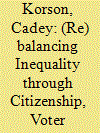

|
|
|
|
|
| Summary/Abstract |
Since 1988, New Caledonia, a sui generis French territory in the Pacific, has experienced increasing autonomy in preparation for a vote on full sovereignty. Beginning in 2018, a series of up to three referenda will determine the future of this archipelago. Although New Caledonians have benefited from ongoing association with France and indigenous Kanak have garnered greater political representation, significant inequalities among ethnic communities persist. Pro-independence Kanak nationalists push for greater political control through a frozen referendum electorate to rebalance indigenous power lost during colonization. At the same time, anti-independence loyalists resent some of the special rights gained by the Kanak because of the decolonization process. The ability and right to express self-determination by voting on the upcoming referendum on sovereignty and defining a new citizenship is intimately tied to issues of inequality and the independence debate. Building on the conceptual framework associated with islandian sovereignty, this paper examines how the rebalancing discourse is a product of internal inequalities that challenge the benefits of subnational island jurisdiction (SNIJ) status. A closer examination of political narratives surrounding the sovereignty debate offers insight into how New Caledonian politicians are using electoral categories, voter eligibility and citizenship to rebalance inequalities.
|
|
|
|
|
|
|
|
|
|
|
|
|
|
|
|
| 2 |
ID:
179515
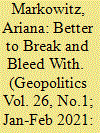

|
|
|
|
|
| Summary/Abstract |
This article is part of the small but growing methodology literature on emotion and trauma in social science research, particularly in relation to studying violence. I argue that, on top of shame around mental health in general and a reluctance to turn our gaze toward ourselves amidst the distress and suffering of our research participants, the weight of positivism in academia, even on those researchers who rebuke the paradigm, silences our ability to engage with what we see, hear, do, and feel as we gather information. Breaking this silence, rather than being unscientific or self-indulgent, promotes clarity in the theories, concepts, and methods we develop to make sense of violence as a social phenomenon. Equally important, learning from ‘helping professionals,’ including trauma therapists, human rights workers, and people involved in disaster relief, offers insight into how a trauma-informed ethics of care, grounded in a collective process of seeking and finding guidance and support, might look. I frame this article around a period of fieldwork in El Salvador that forced me to understand depths of misery and violence that I had never seen up close before. As I unravelled in response, I began to reckon with why I was unprepared and then gradually piece myself back together. I continue striving to soothe, fortify, and heal.
|
|
|
|
|
|
|
|
|
|
|
|
|
|
|
|
| 3 |
ID:
179521
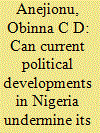

|
|
|
|
|
| Summary/Abstract |
Nigeria is currently embroiled in festering internal political crisis that could undermine its territorial integrity. The centripetal forces that have held the fragile union of various nationalities in Nigeria are waning, due to continuous political tensions orchestrated by unjust and unfair treatment of citizens, bolstered by ethnic and religious differences. The political tensions were tremendously heightened by the 2015 presidential election, which elicited fears that pointed to disastrous consequences. Three years after, the tensions are yet to abate, with increased calls for self-determination by different parts of the country. This provoked the need to investigate the political undercurrents that have persisted in the country, especially those experienced during the 2015 election, to understand how they may have shaped current events in Nigeria. The conceptual framework of this work was guided by the geopolitical theory of “politics of failure”. Connection of current events to Nigeria’s constitutional history was made, and the role it played in foisting a fragile foundation for the country was explored. Geospatial techniques were used to assess political dynamics in the country and their implication on the shrinking ligaments of Nigeria’s unity. This study found that the 2015 general election revealed a strongly divided country. Emerging political fault lines suggest that there is a strong potential of its eventual breakup. With the approaching general elections in 2019, there are indications the country might disintegrate in a violent way, if certain issues are not urgently addressed. Measures including extensive devolution of power, confederation, conduct of self-determination referendum and proportional representation were explored as possible panaceas to the problem.
|
|
|
|
|
|
|
|
|
|
|
|
|
|
|
|
| 4 |
ID:
179518


|
|
|
|
|
| Summary/Abstract |
The data collection strategies we employ affect the quality of our findings. This is particularly true for field researchers of violence and human rights. Working in high-risk, low-information contexts, these researchers are at greater risk of methodological missteps and the accompanying shortfalls for their findings and policy recommendations. We interrogate one methodological challenge particularly common to research in violent contexts: selection bias. While methodology textbooks address this topic generally, little space is dedicated to the unique challenges scholars face in their attempts to avoid selection bias during fieldwork amidst violence. Using survey and interview data from the field, we demonstrate how such a methodological misstep not only biases results, but further marginalises the already marginalised by privileging some voices over others. Asymmetrical power relationships and the normative consequences of selection bias are emphasised. We suggest how scholars of several positivist methodological traditions can address selection bias in the field. Specifically, we urge critically assessing received insight about a fieldsite, multi-method research, long-term engagement in and with fieldsites, and acknowledging biases. We draw on our fieldwork in Mexico and Colombia, referencing our data gathering strategies, quantitative and qualitative evidence, and missteps.
|
|
|
|
|
|
|
|
|
|
|
|
|
|
|
|
| 5 |
ID:
179514


|
|
|
|
|
| Summary/Abstract |
As fieldworkers engage in research in unstable social contexts, standard processes of informed consent are complicated and unsettled. In addition, our work in the field raises complex questions of potential complicity with the violence around us. In this paper, we present a comparative autoethnographic analysis of these dynamics in distinct fieldwork and archival projects dealing with topics of state violence: Gruner-Domic’s work drawing on video archives of testimonios of genocide survivors in Guatemala, and Hallett’s research on the experiences of Salvadoran migrants in the U.S. immigrant detention regime. Both research projects entailed challenges in accessing data without contributing to further violence in the lives of research subjects, given complex and unpredictable future risks and fraught political fields involving warped representations of research subjects. Drawing on these experiences, we argue that ethical responses to such complex field research problems require a flexible approach to methodology, an acute critical reflection on the reproduction of violence, and an awareness of the temporal-geographic complexity and fluidity of risk. While ensuring that we follow standardised protocols for consent and data analysis, researchers should also be prepared to move beyond the standard and think both critically and concretely about our ethical obligations not only while collecting data, but also in the construction of representations.
|
|
|
|
|
|
|
|
|
|
|
|
|
|
|
|
| 6 |
ID:
179520


|
|
|
|
|
| Summary/Abstract |
Alarmism has enabled the extension and reconfiguration of sovereign power at thresholds of human mobility in ways that exemplify the shifting and polymorphic nature of borders. Extending critical geopolitical scholarship on alarmism and the geographies of bordering, this paper examines how alarmism is used to exert control over legal-discursive thresholds that people must cross to gain political asylum in the US. By analysing the most ambiguous area of asylum protection: proving that persecution is motivated by one’s “membership in a particular social group”, I demonstrate how refugee definitions are often contested and changed in response to “floodgate fears”, a type of alarmist legal argumentation. Rather than addressing the merits of an individual asylum case, the floodgate argument invites speculation about the effects a particular juridical decision will have on future cases, and therein translates wider racist, nationalist fears of being overwhelmed by alien “others” into otherwise banal legal codes. In precedent-setting asylum law, these fear-laden speculations can shape legal-discursive thresholds for years to come, enacting targeted exclusion and widening the pool of “legitimate” targets of evolving border enforcement tactics. This analysis of legal alarmism and the formation of asylum case law focuses on the unique relationship between the particular social group threshold and the history and contemporary struggles of Central American asylum seekers.
|
|
|
|
|
|
|
|
|
|
|
|
|
|
|
|
| 7 |
ID:
179513


|
|
|
|
|
| Summary/Abstract |
Ethnographic fieldwork in contexts of war and massive political change has revealed the ways violence produces acute feelings of uncertainty in the lives of our interlocutors. Other research has interrogated modes of techno-scientific expertise deployed to manage uncertain futures. This article, by contrast, argues that violence itself may serve as a technique of uncertainty management, as states, citizens, and spouses alike enact ‘mano dura’ or iron fist crackdowns on disruptive and disobedient bodies – and aspirations. Approaching violence as a technique of uncertainty management reveals the broader political-economic and (geo)political dimensions of interpersonal violence, with implications for analysing violent efforts to enforce social and political order on multiple scales. Further, it illuminates the centrality of intimacy to forms of violence that are seemingly divorced from the ‘intimate’ realm. By attending to a broader conceptualization of ‘mano dura’ as a technique of uncertainty management, this article links ethnographic fieldwork on violence to the methodological, ethical, and epistemological issues raised by ethnographic fieldwork amid violence. Across these intertwined stories, of fieldwork, politics, and the personal, I examine efforts to violently manage uncertain futures with the closed fist that promises – even if it cannot deliver – a defined future, relieved of disorder.
|
|
|
|
|
|
|
|
|
|
|
|
|
|
|
|
| 8 |
ID:
179511
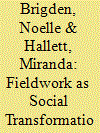

|
|
|
|
|
| Summary/Abstract |
This special issue addresses the urgent need for reflexive introspection about conducting research in violent contexts. To do so, it explores two interrelated dimensions of the places where researchers conduct fieldwork: 1) temporality; and 2) power. In the current political moment, fully engaging with these dimensions of field sites has become an ethical and security imperative, as well as a methodological imperative. Once we put these two dimensions at the centre of analysis, the need to re-conceptualize fieldwork beyond the binaries of here/there and insider/outsider also becomes apparent. Thus, this special issue approaches fieldwork, not only as a means to a research end, but instead, as an opportunity for social action in itself. From a variety of methodological and epistemological positions, the contributors to this issue build on recent feminist work that explores fieldwork’s geopolitical dimensions. Collectively, these interdisciplinary essays argue in favour of reimagining fieldwork as an imaginative and transformative act.
|
|
|
|
|
|
|
|
|
|
|
|
|
|
|
|
| 9 |
ID:
179516


|
|
|
|
|
| Summary/Abstract |
Ethnography is widely accepted to be an embodied and experiential form of knowledge production. Gender, in particular, shapes fieldwork, influencing relationships between participants and researchers, access, and observation, and intersecting with race, class, nationality, sexuality, and other identity categories. Building on a rich tradition of reflexive feminist scholarship that explores this intersectionality, this article discusses how my own corporeal transformation to a muscular powerlifter changed both the nature of my fieldwork relationships and my research strategies over the course of a decade of local engagement in El Salvador. Ultimately, I argue that the embodied consequences of fieldwork and their challenge to patriarchy must be undertaken alongside research participants. Together we are collectively re-imagining gender.
|
|
|
|
|
|
|
|
|
|
|
|
|
|
|
|
| 10 |
ID:
179523


|
|
|
|
|
| Summary/Abstract |
The region of Central-Eastern Europe has been the inspiration of many different geopolitical analyses. This paper focuses on the origins and development of an important concept for the organization of the region; the Polish geopolitical concept of the Intermarium. The roots of this concept can be traced back to the nineteenth century, but the doctrine was formulated most intensively in the interwar period as a reaction to the position of the Polish state located between two great powers – Germany and the Soviet Union. The renaissance of the Intermarium idea in Poland came after the end of the Cold War. At present, the concept has been reintroduced by leading Polish politicians through the creation of the Three Seas Initiative, which aims to integrate the interests of the Central-Eastern European states. In this paper, S. B. Cohen’s concept is applied to discuss the geopolitical situations in which the Intermarium idea emerged and developed.
|
|
|
|
|
|
|
|
|
|
|
|
|
|
|
|
| 11 |
ID:
179512


|
|
|
|
|
| Summary/Abstract |
Researchers studying conflict, violence, and human rights in dangerous settings across the globe face a complex set of ethical, personal, and professional dilemmas. Especially in more positivist fields and professions, there is pressure to conduct and present research as ‘objective’. Yet the reality of field research in violent and conflict-affected settings is much messier than ideals in methodology textbooks or the polished presentation of field data in much published work. I argue that rather than the imposition of blanket positivist standards of replicability and research transparency, research in violent settings needs to draw lessons from interpretivist ideas and methodologies about the researcher’s role in the process of data gathering, analysis, and presentation. I focus on three key issues: reflexivity, temporality, and the geography of research between ‘field’ and ‘home,’ drawing on personal experiences conducting research on conflict, violence, and postconflict society in Liberia, Nicaragua, South Africa, and Uganda. I show how these three issues practically, theoretically, and ethically conflict with replicability and transparency demands. Through a practice of reflexive openness, however, positivist-leaning researchers can more honestly and ethically reconcile realities of research with professional expectations in the field and after returning.
|
|
|
|
|
|
|
|
|
|
|
|
|
|
|
|
| 12 |
ID:
179517


|
|
|
|
|
| Summary/Abstract |
In this article, I reflect on my experience conducting fieldwork in some of the violent neighbourhoods of urban Honduras. Using examples from ethnography conducted in and around San Pedro Sula on life after deportation for Honduran migrants, I make two interventions into broader discussions regarding the methodological adaptations necessary for conducting research in violent contexts. First, I tease out the complex relationship between studying within the context of violence and studying violence itself. I ask: does ethnography in violent contexts inevitably become ethnography of violent contexts? From there I discuss navigating risk and security as an outsider-insider, challenging the idea that local knowledge is always uniform, reliable, and applicable to a researcher. Drawing from my experience in the field, I argue that understanding the local “rules” combined with cultivated distance can be strategic both for the outsider-ethnographer and the locals with whom she is working.
|
|
|
|
|
|
|
|
|
|
|
|
|
|
|
|
| 13 |
ID:
179519
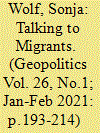

|
|
|
|
|
| Summary/Abstract |
Individuals and families are being displaced from the Northern Triangle of Central America by structural and physical violence. Clandestine migration increases the invisibility of forced migrants and makes them difficult to access for researchers. Gatekeepers perceive or depict forced migrants as vulnerable populations and often deny investigators access to them, arguing that traumatised people should not be asked to retell their stories and be revictimised. The growing literature on research participation suggests that individuals categorised as vulnerable often decide to collaborate in studies, because they welcome the opportunity to talk about their experience to an empathetic listener and to help improve policies and services. Immediate distress produced by revisiting painful moments in life often dissipates quickly and is outweighed by the benefits of research participation, such as feelings of catharsis and a sense of acknowledgement and purpose. When gatekeepers deny investigators access to vulnerable population groups, they preclude them from autonomously deciding whether to grant or withhold informed consent and from exercising their right to participate in research. Their invisibilities and silences render migrants more susceptible to human rights violations. Taking protection seriously means widening the research participation of vulnerable individuals.
|
|
|
|
|
|
|
|
|
|
|
|
|
|
|
|
|
|
|
|
|